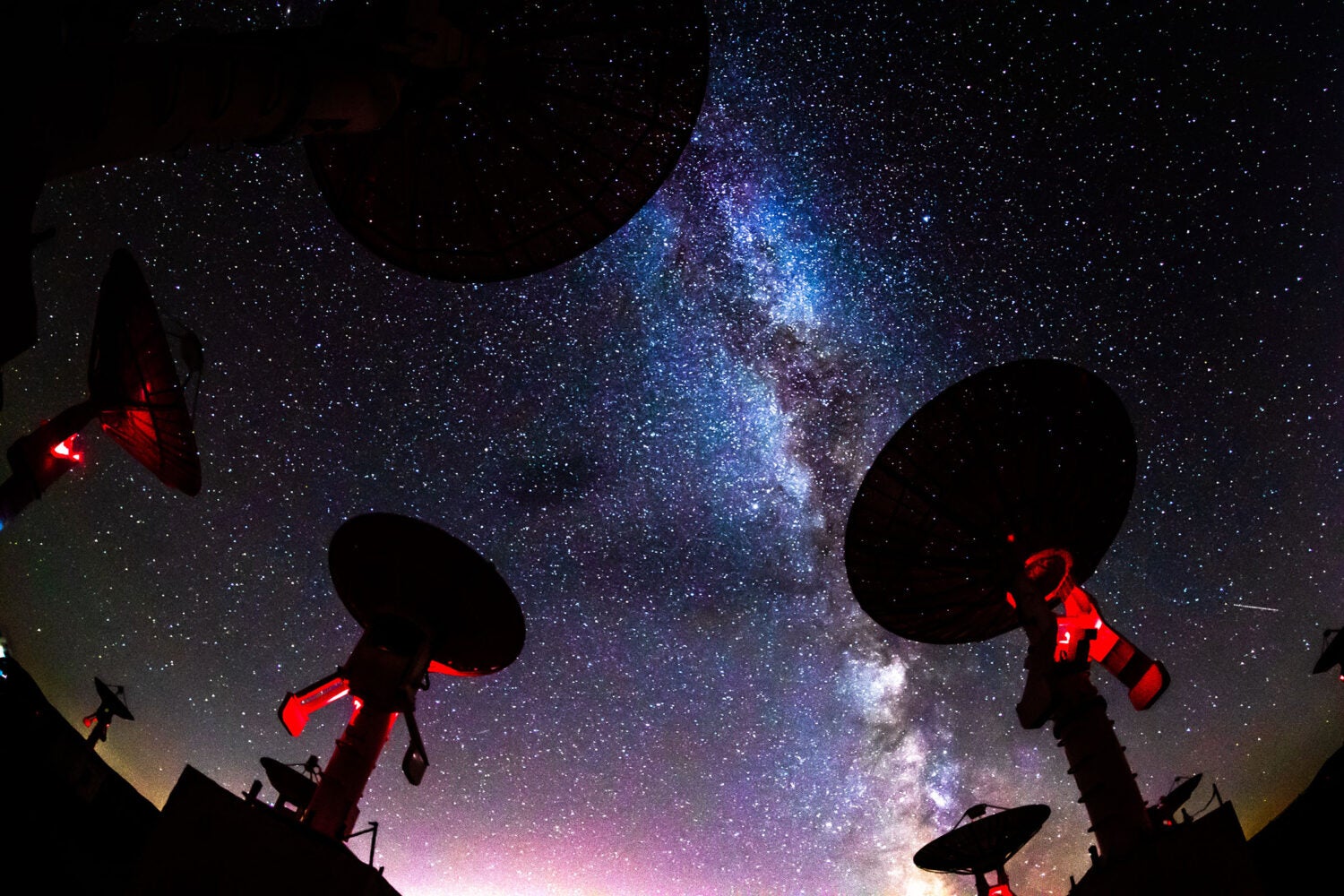The next big legal field is out of this world — literally.
At least, so says Memme Onwudiwe ’19, a lecturer on law at Harvard. Although an alien subject to many practicing lawyers today, knowledge of space law is likely to be vital to attorneys of the future, says Onwudiwe, who is also a co-founder of Evisort, an AI-driven contract management software company.
That’s because what happens in outer space increasingly affects our lives on Earth — from hosting satellites that power the internet and our cell phones, to space tourism and exploration, to national and global concerns like control of resources extracted from extraterrestrial sources and even warfare in space.
Onwudiwe has long been interested in cutting-edge legal topics like space law, particularly as it relates to Africa, and has taught workshops about the subject at the U.S. Air Force’s Air Command and Staff College. In an interview with Harvard Law Today, Onwudiwe, who is also on the advisory council of the Space Beach Law Lab, explains what space law is, why lawyers (and the rest of us) should care — and just how much of the field has yet to be explored.

Harvard Law Today: What, exactly, is space law? Is it a new field, or has it been around a while?
Onwudiwe: Space law can mean a lot of different things. It can mean public or private law, and it can involve different levels of government. First, there are a lot of companies that already operate in space. Maybe they have satellites in low Earth orbit, and there are issues that they have to contend with while operating in space, like dealing with the Federal Aviation Administration (FAA) or the Federal Communications Commission (FCC).
A lot of where my research work comes in is on the global level. There is the Outer Space Treaty, which is a global treaty that dates to 1967. At the time, only the U.S. and the U.S.S.R. were spacefaring nations. But now it is negotiated out of the UN Office for Outer Space Affairs (UNOOSA). The treaty is pretty vague, in that it basically only says high level things like, “we won’t nuke each other from space.” Despite that, it’s still the treaty that binds countries globally related to activities in space.
HLT: Why might there be increased interest in space law right now?
Onwudiwe: Recently, there has been more interest in space law because of NASA’s Artemis program. In Greek mythology, Artemis was the twin sister of Apollo. The Apollo mission put humans on the moon. The Artemis mission is trying to build a base to further explore the moon and eventually allow us to put humans on Mars. Unlike the Apollo program, the Artemis program also has a parallel agreement called the Artemis Accords, and those are agreed to on a bilateral nature with different partners of the United States. It’s basically a way of governing activities in space domestically, outside of the global UNOOSA program. The U.S. is currently negotiating with its bilateral partners on these Accords. They claim to be negotiating them under the Outer Space Treaty, which, remember, was agreed to at the global level, but again, that treaty is really, really vague.
There are other things, such as the Moon Agreement, for example, which also claims to be under the Outer Space Treaty but is in conflict with the Artemis Accords. And so, because the Artemis Accords are being done bilaterally, and because there are laws, for example, preventing China from being directly connected to NASA, even if China wanted to join the accords, they couldn’t. (The Wolf Amendment, which Congress passed in 2011, bars NASA from directly working with China or Chinese affiliates.) So, Russia and China have basically articulated their own agreement to create their own research facility in space that they’re going to call the International Lunar Research Station. And like the Artemis Accords, they’re opening that up to other governments.
HLT: What are some of the major issues in space law?
Onwudiwe: One big issue is questions around the exploitation and allocation of resources mined in space. This issue is very vague at the Outer Space Treaty level. The treaty says that you can’t really own any particular celestial body, but we’ve interpreted that to say if you go the celestial body and you take a part of it back to Earth, then you can own that. The Moon Agreement, which currently has 18 signatory countries, says that there needs to be an international regime that’s established to govern the exploitation of resources in space and make sure that they’re equitably spread out to different parties. In contrast, the Artemis Accords have no such restriction on exploitation of space resources. Here is the issue: even though the agreements are different, they both claim to adhere to the vague Outer Space Treaty. I also want to note that several nations, including the U.S., rely on the Artemis Accords, and now have domestic legislation that enables companies to engage in the for-profit exploitation of space resources.
Another thing to think about is the governance of wavelength, the radio spectrum, which satellites need to operate. Every three or four years, the World Radiocommunication Conference comes together and decides which countries get different bands of wavelengths. Think about DirecTV, and how it might be in competition for a wavelength that SpaceX also wants, which erupts into fights at the domestic level. It includes everything from satellite radio GPS to TV, the internet, etc. Even past that domestic fighting, there’s global fighting over which countries even get those bands. Historically, the U.S. and the U.K. get the most bands, but as more countries are developing, they’re saying there needs to be a more equitable way to distribute this limited resource.
And then, I just spoke a couple of weeks ago at the Space Beach Law Lab, in Long Beach, California. That group includes a lot of general counsel and chief legal officers of space companies. The issues they’re dealing with are more along the lines of how to get FCC or FAA approval on something they want to do, versus something like the exploitation of resources at the Outer Space Treaty level. In other words, there are different levels that people are operating on.
HLT: Beyond those issues, what are governments concerned about related to space?
Onwudiwe: One of the highest-level concerns is around the militarization of space. We always see these clickbait articles about nukes in space and stuff like that, but by promoting Space Force, the U.S. has de facto adopted the view of space as a warfighting domain. What that means going into future conflicts is interesting.
Or think about the issues around SpaceX and Starlink, and how they were providing internet to the Ukrainians during this conflict with Russia. Then, at a certain point, Elon Musk worried that by doing that too much, it might be a way of the U.S. being dragged into the war, because a private U.S. company was providing capabilities to Ukraine, allowing them to attack targets in Russia. Now SpaceX aims to provides these kinds of military services are provided by their project “Starshield.”
“One of the highest-level concerns is around the militarization of space. … by promoting Space Force, the U.S. has de facto adopted the view of space as a warfighting domain.”
So, it might not be nukes in space, but there are already ways that having control in space is changing things militarily in terrestrial wars. What that will continue to look like — space as a warfighting domain — I think is important. The next step seems to be that the U.S., Russia, and China have already announced permanent moon bases.
And then, again, ownership of things in space, and then also exploitation of resources. There are two things that govern my personal view on space: one is that 99.9% of everything that exists is outside of Earth — and that is a super generous statistic to Earth. Realistically, basically 100% is outside of our planet. And the only reason we don’t care about who owns and controls that 99% of everything is because we can’t control 99% of everything. But the second we can — that’s going to be really important; much more important than controlling the small amount of stuff that’s on Earth. That’s because much of our economy is based off rare earth metals, which only rare on Earth. Let’s say you find an asteroid with more platinum than there is on Earth — what does that mean? Who owns and can profit from that?
These questions are really big, and the only reason we haven’t grappled with them is because we haven’t had to. But the second we do, it’s going to dwarf terrestrial issues, because of the vast size of the opportunity out there in space.
HLT: What kinds of regulations, laws, or treaties do we need but don’t yet have related to space?
Onwudiwe: There’s a lot to yet be decided on because we don’t really have a well-articulated space law. We have that Outer Space Treaty from 1967 that I mentioned, and everything else is domestic or bilateral in nature.
I think a lot of what is being done at the bilateral level with the Artemis Accords, we should look at cementing at the multilateral, global level — out of UNOOSA. With the bilateral agreements, the argument is that they’re being done within the bounds of the Outer Space Treaty, but again, that treaty is very vague. And so, if everyone does that, you’re going to have hundreds of completely different regimes that are claimed to be under the Outer Space Treaty, but they would all completely conflict.
“I think space law is going to become like the internet … no matter what kind of law I practice, I must have a general understanding of it, because so many things in our world are powered by and through it.”
HLT: A few years ago, you co-authored a paper for the Journal on Space Entrepreneurship and Innovation called “Africa and the Artemis Accords: A Review of Space Regulations and Strategy for African Capacity Building in the New Space Economy.” Could you tell me about it?
Onwudiwe: It’s centered around African nations who are more early in their space development. It was released in 2021, when the Artemis Accords were fresh on the scene. The paper gives a review of all the space regulations that have happened up until that time at the global level, and then it talks about how African countries should position themselves and engage with each of these organs, with a particular focus on the Artemis Accords.
HLT: What is the future of space law? Why should lawyers care about it?
Onwudiwe: I think it’s going to become like the internet, where no matter what kind of law I practice, I must have a general understanding of the internet, because so many things in our world are powered by and through it. I feel that, as more and more things happen in space, where the economy moves out there, it becomes crucial to have a basic understanding of it. You wouldn’t be operating as a lawyer today if the internet was completely foreign to you, and I think that will someday be the case with space. We haven’t hit a tipping point yet — I’m not saying it’s necessary to know right now or in the next 5-10 years. But as we are getting to a place where so many activities are going to have space components, lawyers are going to need to have understandings of the issues that arise once you move to that domain.
Want to stay up to date with Harvard Law Today? Sign up for our weekly newsletter.
